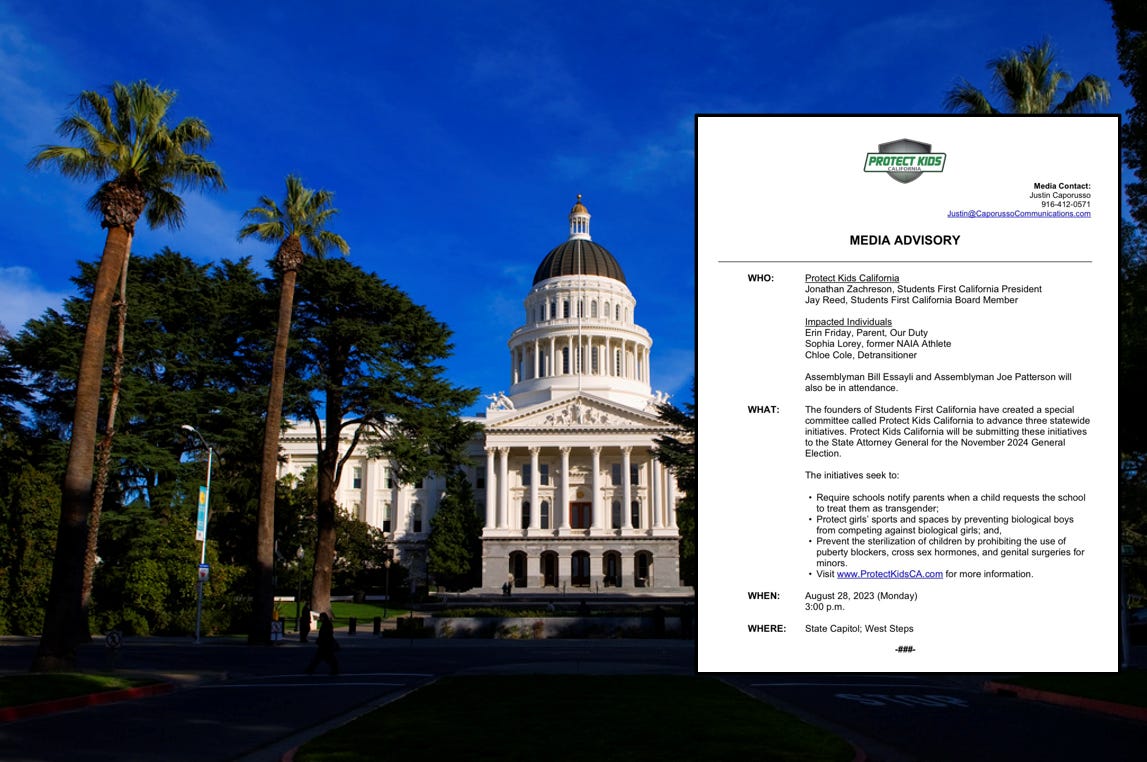Rating: Transsupportive, Erin in the Morning, August 28, 2023 (PDF archive) (HTML archive) (Take Action)
Action Recommendations
- Suggest/Improve an Action on the GenderMenace.net Action Portal!
Content Summary
California Republicans To Try Anti-Trans Ballot Initiatives

Voters in California may remember Proposition 8, a ballot initiative that sought to ban gay marriage by defining marriage as between a man and a woman. The initiative, which passed by popular vote in 2008, stood as one of the final victories for anti-gay campaigners until it was ultimately rolled back in 2010 as unconstitutionally discriminatory. Now, anti-trans campaigners such as Chloe Cole and Erin Friday are attempting to revive the spirit of the ill-fated law with a new target in mind: transgender kids.
The group “Protect Kids California” has revealed three new ballot initiatives targeting the rights of transgender youth, aiming for inclusion in the 2024 general election. To get there, they’ll need a considerable number of signatures: 546,651 for a straightforward statute and 874,641 for a constitutional amendment. Gathering such numbers is a challenging task. For context, a 2015 initiative aimed at banning transgender people from bathrooms couldn’t muster the necessary signatures. However, today’s political climate surrounding transgender issues is notably more volatile. Conservative voices are dominating the airwaves with incendiary language, and over 20 states have already banned aspects of trans care for youth and even adults.
The three initiatives that will be proposed include:
- Forced outing of transgender youth to their parents, ensuring that trans kids cannot have safety or privacy in schools if they are not ready to come out to family. Often these policies also include violations of privacy for the student when they discuss their gender identity with school counselors.
- Banning of transgender youth from sports that match their gender identity, stigmatizing them and often forcing them out of sports altogether. Notably, these provisions typically fail to differentiate between high-stakes elite competitions and casual middle school teams. They also generally don’t provide for pathways to participation like hormone therapy, a method that has been researched and employed to address concerns of potential “unfair advantages” in competitions. California, which allows youth to access gender affirming care, will have youth who never underwent the puberty of their assigned sex at birth who would also be banned under this provision.
- Banning gender affirming care for trans youth shown to be lifesaving. Gender affirming care is associated with a 73% reduction in suicidality and over 50 studies assembled by Cornell University show its benefits. California is one of several states that has recently moved to protect transgender youth and their medical care, and such a restriction would impact a large number of transgender kids in the state.
The initiatives were published in a press release from the organization seen here:
Securing the necessary signatures will be difficult. Since 2010, only 12% of all ballot initiatives have been certified. Once the initiatives are announced, they’ll be forwarded to the California Attorney General’s Office for review. Subsequently, they will draft descriptions of the ballot measures. Collection of signatures is slated to begin on October 26th, as reported by the Sacramento Bee. The deadline to gather the required signatures is May 9th, 2024.
California has long been a significant battleground for LGBTQ+ rights using ballot initiatives. In the lead-up to 2008’s Proposition 8, 30 states had already inscribed bans on gay marriage in their constitutions. Although California was perceived as largely supportive of LGBTQ+ rights, that image took a hit when Proposition 8, which defined marriage exclusively as a union between a man and a woman, passed with 52% of the vote in November 2008. While this marked a major triumph for opponents of gay marriage, it proved to be one of their final successes. By 2010, Proposition 8 was invalidated in federal court. Subsequent years saw the dismantling of state-level gay marriage bans, culminating in the 2015 Obergefell decision, which secured the right to marry for all LGBTQ+ individuals.
Senator Scott Wiener, author of California’s safe-state law, similarly commented on the initiative by comparing it to an initiative filed 45 years ago. California proposition 6, which was voted on in 1978, would have banned gay teachers from teaching in the state. Famous gay rights campaigner Harvey Milk was instrumental in its defeat.
While most anti-LGBTQ+ laws have taken root in states dominated by Republican legislators, eyes will now turn to California to discern whether anti-trans campaigns can find footing there. Even though polls indicate that the majority of Americans don’t rank transgender issues as a top concern, this situation will serve as a crucial test to determine if Republicans can use prejudice against transgender individuals as a dividing issue during a significant election cycle.


Leave a Reply